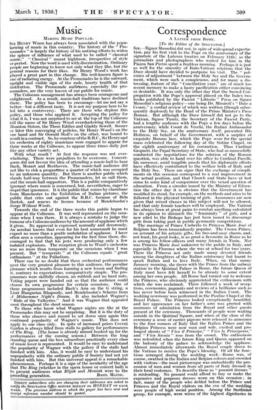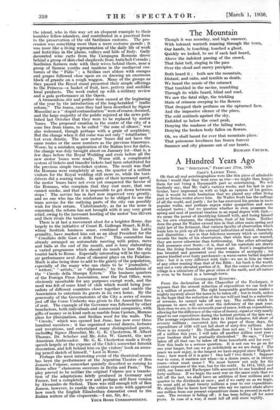Correspondence
A LETTER FROM ROME.
[To the Editor of the SPECTATOR.] Sin,—Signor Mussolini did not, in spite of widespread expecta- tion, pay his first visit to the Pope on the anniversary of the signature of the Lateran treaties on February 11th; so the journalists and photographers who waited for him in the Piazza San Pietro spent a fruitless morning. Perhaps it is just as well for the sincerity of Italo-Vatican relations that the Duce should have decided to postpone his visit. The " pol- emics of adjustment" between the Holy Sec and the Govern- ment, which were such a conspicuous, and for many a dis- tressing, feature of the " Conciliation year," are of much too recent memory to make a hasty pacification either convincing or desirable. It was only the other day that the Sacred Con- gregation with the Pope's approval placed on the Index two books published by the Fascist " Littorio " Press on Signor Mussolini's religious policy—one being Dr. Missiroli's " Date a Cesare," a cordial review of which was written (though subse- quently deplored) by the Head of the Prime Minister's Press Bureau. But although the Duce himself did not go to the Vatican, Signor Turati, the Secretary of the Fascist Party, had a lengthy audience with the Pope a few days before the anniversary, while Count de Vecchi, the Italian Ambassador to the Holy See, on the anniversary itself, presented His Holiness, on behalf of the Government, with a surplice of exquisite Burano lace, which the Pope wore for the special mass celebrated the following day at the Sistine Chapel, on the eighth anniversary of his coronation. Thus Cardinal Gasparri, the Papal Secretary of State, who had so successfully conducted the negotiations for the solution of the Roman question, was able to hand over his office to Cardinal Pacelli, his successor, amid tangible proofs that his diplomatic efforts have effectively contributed to the welfare both of Italy and the Holy See. There are signs that the exchange of compli- ments on this occasion correspond to a real improvement in the actual position, and that Church and State have at last come to some kind of compromise over the vexed question of education. From a circular issued by the Ministry of Educa- tion the other day it is obvious that the Government has modified its stand, for example, on the methods and aims to be followed in the physical training of girls. Assurances are now given that mixed classes in this subject will not be allowed, and that only female teachers will be employed. The Vatican has always been at great pains to combat anything calculated in its opinion to diminish the " femininity " of girls, and a new edict to the Bishops has just been issued to discourage girls from taking part in public gymnastic competitions.
The marriage of Prince Umberto to Princess Marie Jose of Belgium has been tremendously popular. The Crown Prince, on account of his artistic gifts, his free-and-easy charm, and, not least, his good looks, is as great a favourite in Rome as he is among his fellow-officers and many friends in Turin. Nor was Princess Marie Jose unknown to the public in Italy, and especially in Florence where she was at school for two years. There the Princess not only made many devoted friends among the daughters of the Italian aristocracy but learnt to speak Italian and to love Italy. When, on that sunny January morning, she drove with the Prince from the railway station to the Quirinal Palace in Rome, the future Queen of Italy must have felt herself to be already to some extent among her own people. All Rome had turned out to welcome the Princess, who obviously appreciated the enthusiasm with which she was acclaimed. There followed a week of recep- tions, ceremonies, pageants and reviews of a brilliance such as has never before been witnessed in the Italian Court. The wedding ceremony was performed in the Pauline Chapel at the Royal Palace. The Princess looked exceptionally beautiful, and her appearance on her father's arm was greeted with murmurs of admiration from the Royal and other guests present at the ceremony. Thousands of people were waiting outside in the Quirinal Square, and when at the close of the ceremony a score of carrier pigeons were released to announce to the four corners of Italy that the Italian Prince and the Belgian Princess were now man and wife, excited and pro- longed shouts of " Viva it Principe," " Viva In Principessa," and " Viva Savoia" rose from the crowd. The enthusiasm was redoubled when the future King and Queen appeared on the balcony of the palace to acknowledge the applause. Almost immediately afterwards the Royal couple drove to the Vatican to receive the Pope's blessing. Of all the func- tions arranged during the wedding week—Rome was, of course, swathed in the Italian and Belgian colours and crowded with visitors—the most picturesque was undoubtedly the pro- cession of men and women from all parts of Italy dressed in their local costumes. To describe these as " peasant dresses " is misleading. No peasant could afford to buy or make the expensive and gorgeous dresses worn on this occasion ; in fact, many of the people who defiled before the Prince and Princess and the Royal visitors on the eve of the wedding were people of high social position. Among the Sardinian group, for example, were wives of the highest dignitaries in
the island, who in this way set an eloquent example to their humbler fellow-islanders, and contributed in a practical form to the preservation of the old Sardinian customs. The pro- cession was something more than a mere costume parade ; it was more like a living representation of the daily life of work and festivities in the plains, valleys and hills of Italy; Gaily decorated wine carts from the Campagna Romans drove behind a group of skin-clad shepherds from Anticholi Corrado ; Sardinian farmers rode with their wives behind them, near a group of Sienese youths and maidens in the mediaeval coa- tumes of the " Palio " ; a Sicilian cart ablaze with oranges and grapes followed close upon an ox drawing an enormous block of granite on a rough waggon. Many of the groups as they passed the Royal stand presented their simple offerings to the Princess—a basket of fruit, lace, pottery and suchlike local products. The week ended up with a military review and a gala performance at the Opera.
A tremendous stir and pother were caused at the beginning of the year by the introduction of the long-heralded traffic reform. The trams, once they had been described by Signor Mussolini as a " stupid contamination " were of course, doomed, and the large majority of the public rejoiced at the news pub- lished last October that they were to be replaced by motor 'buses. The proposed creation in the centre of the city of a zone free from trams, to be called "the zone of.silence,' was also welcomed, though perhaps with a grain of scepticism, But the change when it did come was not only " totalitarian " but even drastic. The new motor 'buses did not have the same routes or the same numbers as the previous tramways. Worse, by a mistaken application of the Italian love for dates, the change was duly brought about on January 1st—that is, a few days before the Royal Wedding and even before all the new motor 'buses were ready. Worse still, a complicated system of tickets and transfer tickets had been substituted for the previous simple two-ticket system. The result was that the Romans were completely at sea, the quarter of a million visitors for the Royal wedding still more so, while the taxi- drivers did a roaring trade. In spite of their increased speed, the motor 'buses have not even yet conquered the favour of the Romans, who complain that they cost more, that one cannot smoke, and that it is impossible to get down between stops ! The service has in fact now improved very greatly, and no one who has the misfortune to be obliged to use the tram service for the outlying parts of the city can possibly wish for their return. Unfortunately, as far as the noise is concerned, the reform has not brought with it any very great relief, owing to the incessant hooting of the motor 'bus drivers and their rivals the taximen.
There is at last a movement afoot for a brighter Rome, due largely to the initiative of Count R. Gallenga Stuart, K.B.E., whose Scottish business sense, combined with his Latin geniality, have marked him out as an ideal President for the Comitato delle Gare e delle Feste." This committee has already arranged an automobile meeting with prizes, races and balls at the end of the month, and is busy elaborating a varied programme which should do much to lure the shy tourist back to Rome. Especially interesting will be the open, air performance next June of classical plays on the Palatine. Much is also being done to add to the gaiety of the population, especially of the many who can claim to be " journalists," " writers," " artists," or " diplomats," by the foundation of the " Circolo della Stamps. Estera." The business quarters of the Foreign Press Association, near the Post Office, were obviously unsuitable for any purposes except work, and the need was felt of some kind of club which would bring jour- nalists of different countries closer together and enable the Association to entertain its guests in its own home. By the generosity of the Governatorato of the City a series of rooms Just off the Corso Umberto was given to the Association free of rent. The example of the Governor was followed by other benefactors, both individuals and commercial companies, with gifts of money or in kind such as marble from Carrara, Murano glass for illumination, and Sicilian woof for the walls. The
Circolo," which was opened last June, has now ever three hundred members; has organized several dances, lectures and receptions, and entertained many distinguished guests, including Signor Mussolini, Mr. G. K. Chesterton, M. Albert Thomas, Dr. Schober and Mr. John W. Garrett, the new American Ambassador. Mr. G. K. Chesterton made a lively. speech largely at the expense of the Club's somewhat futurist decoration, and left behind him on the visitors' book an amus- ing pencil sketch of himself, " Last in Rome."
Perhaps the most interesting event of the theatrical season
has been the performance at the Argentina Theatre of Ben Jonson's Volpone, somewhat quaintly described as coming to Rome after "clamorous success - s in Berlin and Paris." The play proved to be neither the original Volpone nor a transla- tion of the adaptations lately produced in Germany and France, but a completely new and perhaps still freer version by Alessandro de Stefani. There was still enough left of Ben Jonson, however, to enable the critics to note- with approval how much the English Elizabethan dramatist owed to the- Italian writers of the cinguecenfo.—I am, Sir, &c.,
YOUR ROME CORRESPONDENT.

























































 Previous page
Previous page